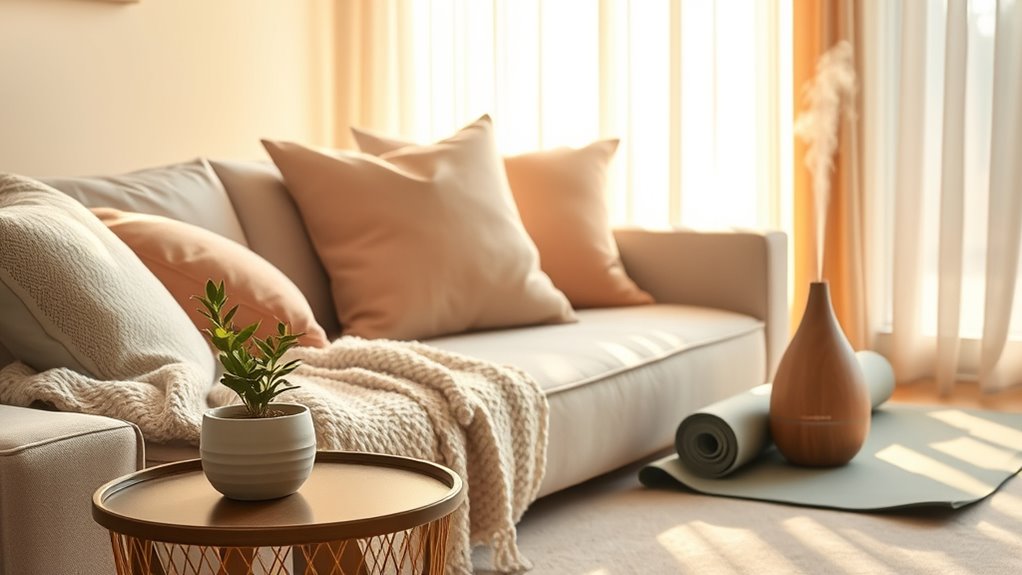To manage stress and anxiety at home, establish a structured routine with clear goals and regular sleep times to bring stability. Create a calm, clutter-free space using soothing colors and organized storage. Practice mindfulness, deep breathing, or gentle exercise daily to promote relaxation. Limit stressful news and set boundaries to protect your personal time. Engaging in hobbies and environment upgrades can also boost your mood. By applying these tips, you’ll find more peace—explore further tips to stay balanced.
Key Takeaways
- Establish a daily routine with clear boundaries to create predictability and reduce stress.
- Keep your living space organized and clutter-free using soothing colors and natural materials.
- Practice mindfulness, deep breathing, and regular physical activity to promote relaxation and mental clarity.
- Limit exposure to stressful news and social media; engage in hobbies and joyful activities.
- Incorporate calming environment enhancements like aromatherapy, greenery, and soft lighting to foster tranquility.
Establish a Routine to Bring Structure to Your Day
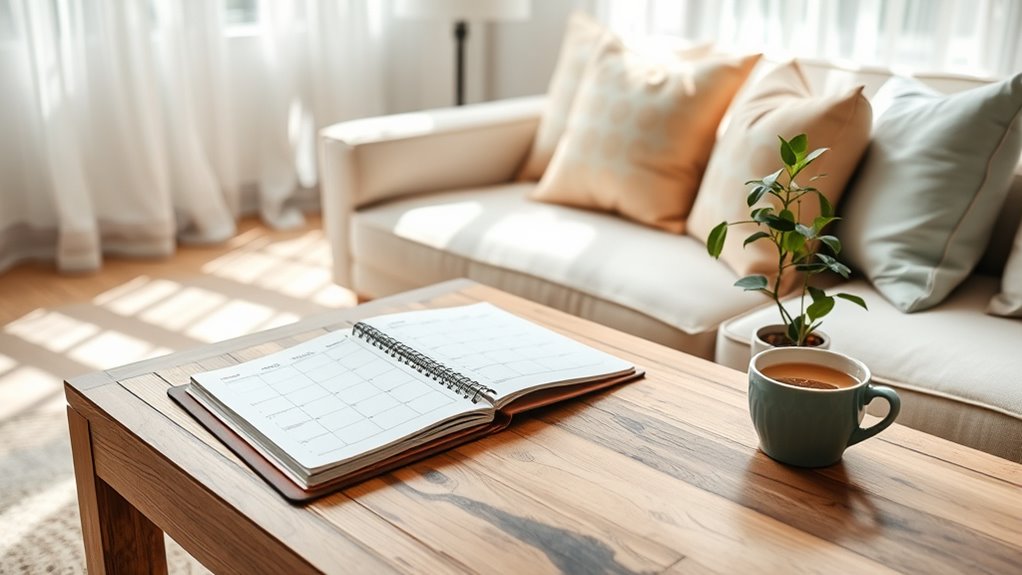
Creating a daily routine helps you regain a sense of control and stability, especially during stressful times. When you establish a routine, you improve your time management skills, making it easier to allocate time for essential tasks and self-care. Set clear goals for each day, whether it’s finishing a project or taking time to relax. By sticking to scheduled wake-up, work, and rest times, you create predictability that reduces anxiety. Prioritize tasks based on importance and set realistic expectations. A well-structured day keeps you focused and prevents chaos from taking over. Remember, consistency is key—over time, your routine will become second nature, helping you manage stress more effectively and regain confidence in steering daily challenges. Incorporating a consistent schedule into your routine can also support better sleep patterns, further enhancing your ability to handle stress.
Create a Calm and Organized Living Space
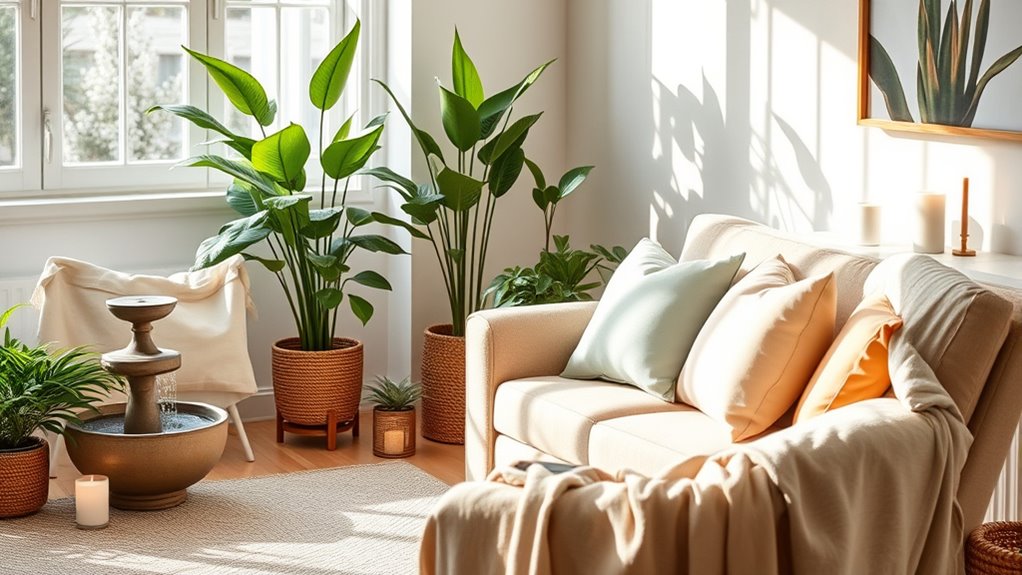
A calm, organized space can profoundly reduce your stress. Regularly declutter to clear your mind, choose soothing colors to create a peaceful atmosphere, and use smart storage solutions to keep everything tidy. These simple steps help transform your home into a relaxing sanctuary. Incorporating sound healing science such as calming sound frequencies and vibrations can further enhance your sense of tranquility. Additionally, incorporating practical tips such as designated zones for different activities can further enhance your sense of order and tranquility. Creating a dedicated space for relaxation can also support your mental well-being by providing a retreat from daily stressors. Engaging in vegetable juices that promote relaxation and overall health can also support your mental well-being. Remember, creativity can be cultivated through intentional efforts to improve your environment and mental clarity, fostering a more peaceful living space.
Declutter Regularly for Clarity
When your living space is cluttered, it can quickly feel overwhelming and stressful. Regular decluttering helps you maintain a minimalist living environment that promotes calm and focus. By practicing clutter control, you clear out unnecessary items that weigh on your mind and space. Set aside time weekly to organize and discard what you no longer need, making it easier to find what matters. A tidy home reduces visual noise and creates a sense of order, which can profoundly lower anxiety levels. Keep only essentials and meaningful possessions visible, and store the rest out of sight. This habit not only fosters clarity but also encourages a more intentional lifestyle. Incorporating natural materials and cozy textiles can further enhance your space’s calming effect. Using vetted indoor planters to add greenery can also improve your mood and air quality. Additionally, arranging your space with dog-friendly furniture can make your environment more comfortable and welcoming for your furry friends. When your environment is streamlined, you’ll feel more relaxed, centered, and in control of your mental well-being. Regular cleaning and air purification can also contribute to a healthier, more serene atmosphere.
Incorporate Soothing Colors
Incorporating soothing colors into your living space can considerably reduce stress and promote a sense of calm. Using color psychology, you can select soothing palettes that create a peaceful environment. Here are three ways to do it: 1. Choose soft, muted tones like pastels or gentle earth shades to foster relaxation. 2. Use blues and greens, known for their calming effects, to help lower anxiety levels. 3. Limit bold or bright colors that might overstimulate your senses and disrupt tranquility. Additionally, selecting colors that align with sound design principles—such as creating a balanced and harmonious environment—can further enhance your overall sense of well-being. Recognizing the importance of dog breeds and their unique traits can also contribute to a more comforting and personalized space, promoting mental peace. Incorporating stress management techniques, such as mindful breathing or meditation, can also support mental relaxation and stress reduction.
Use Organized Storage Solutions
Using organized storage solutions can substantially enhance the calming atmosphere you’ve created with soothing colors. When you implement effective organized storage, you reduce visual clutter, making your space feel more peaceful. Use decluttering strategies to identify items you no longer need and find designated places for everything. Invest in storage bins, shelves, and containers that suit your space and style, keeping essentials accessible yet out of sight. Regularly tidying up helps maintain a clutter-free environment, which calms your mind and reduces stress. Incorporating visual clutter reduction techniques can further improve the overall sense of order. Adopting multi-functional furniture can maximize your space and simplify organization by reducing the need for additional storage. Incorporating essential oils known for their calming properties can also promote relaxation in your organized space. Understanding zodiac sign compatibility can help you tailor your organizational habits to suit your personality, making it easier to maintain order. Clear, organized spaces foster a sense of control and tranquility, making it easier to relax at home. With intentional storage solutions, your living area becomes a sanctuary where peace and order support your mental well-being.
Practice Mindfulness and Deep Breathing Exercises
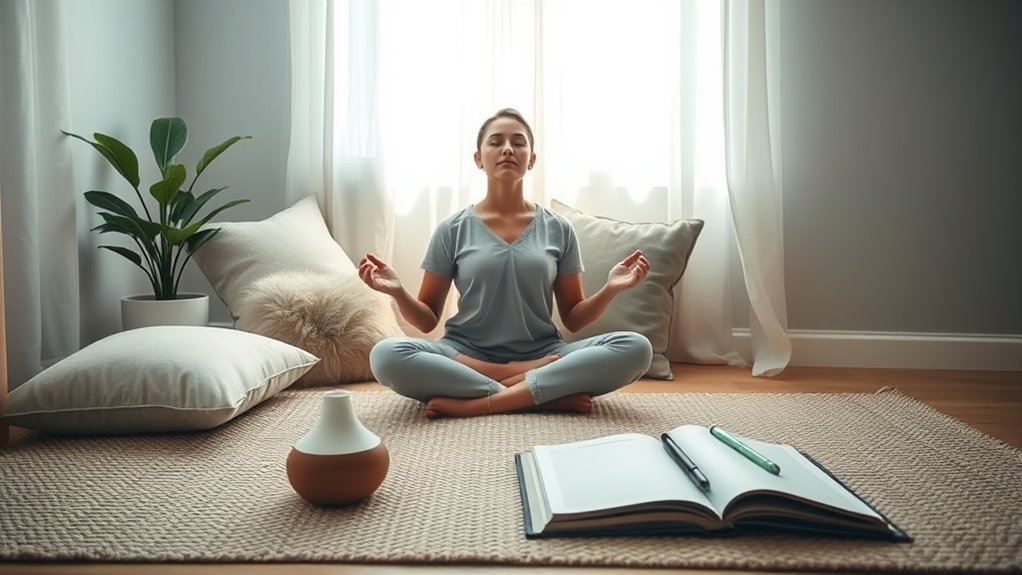
Practicing mindfulness and deep breathing can help you feel calmer and more centered. Focus on your breath awareness, and try guided meditation sessions to deepen your practice. Establishing routine sessions makes it easier to experience these benefits consistently. Incorporating mindfulness techniques when using tools like paint sprayers can also reduce stress related to project challenges. Additionally, creating a dedicated space for meditation that emphasizes aesthetic appeal and comfort can enhance your focus and relaxation during practice. Incorporating comfortable and supportive meditation environments can further promote consistency and effectiveness in your mindfulness routine.
Focus on Breath Awareness
Focusing on your breath can be a simple yet powerful way to manage stress and anxiety at home. To enhance your awareness, try these techniques:
- Practice diaphragmatic breathing by deepening your inhale into your belly, not your chest, to promote relaxation.
- Use breath counting—inhale, then count each breath up to five or ten—to center your attention and calm your mind.
- Pause periodically throughout the day to observe your breath without judgment, noticing its natural rhythm.
These methods help you stay present and reduce stress. By consciously directing your attention to your breath, you can create a sense of calm and regain control during anxious moments. Regular practice makes these techniques even more effective.
Incorporate Guided Meditation
Building on the calming effects of breath awareness, guided meditation offers a structured way to deepen your relaxation. It combines mindful breathing with techniques like body scan meditation, helping you release tension and center yourself. During a session, you may focus on your breath or systematically notice sensations across your body. This practice enhances awareness and reduces stress. To visualize, consider this table:
| Step | Focus |
|---|---|
| 1 | Find a quiet space |
| 2 | Close your eyes and breathe deeply |
| 3 | Conduct a body scan, noting tension |
| 4 | Return to mindful breathing |
| 5 | Gently end with awareness of surroundings |
Incorporating guided meditation regularly sharpens your mindfulness and deepens relaxation.
Establish Routine Sessions
Establishing routine sessions for mindfulness and deep breathing can considerably improve your ability to manage stress daily. Consistent practice boosts your emotional resilience and helps you better handle unexpected challenges. To make this effective, consider these tips:
- Schedule specific times each day for mindfulness or deep breathing exercises, improving your time management and ensuring consistency.
- Keep sessions short—5 to 10 minutes—to make them manageable and sustainable.
- Use guided recordings or apps to stay focused and deepen your practice, reinforcing emotional resilience over time.
Incorporate Physical Activity Into Your Daily Schedule
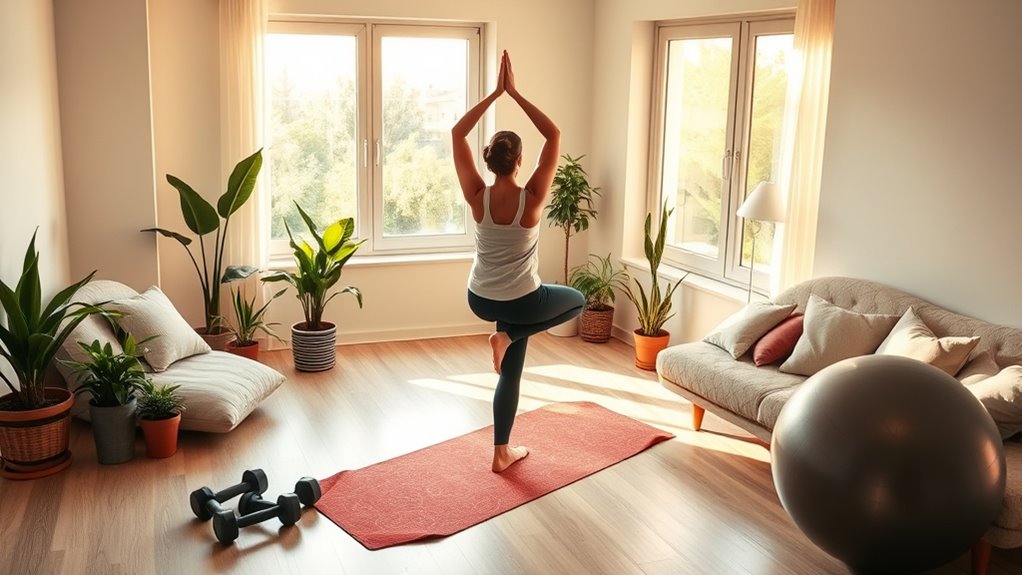
Adding physical activity to your daily routine can substantially reduce stress and anxiety, even if your schedule is busy. Start with simple indoor stretching to loosen up muscles and clear your mind. Incorporate quick home workout routines, like bodyweight exercises, to boost your energy and mood. These activities don’t require special equipment or long hours; even 10-minute sessions can make a difference. Schedule these exercises at times that work best for you, whether mornings, lunch breaks, or evenings. Regular movement helps release endorphins, which naturally lift your spirits and reduce tension. By making physical activity a daily habit, you create a powerful tool to manage stress and promote overall well-being right from the comfort of your home.
Limit Exposure to Stressful News and Social Media
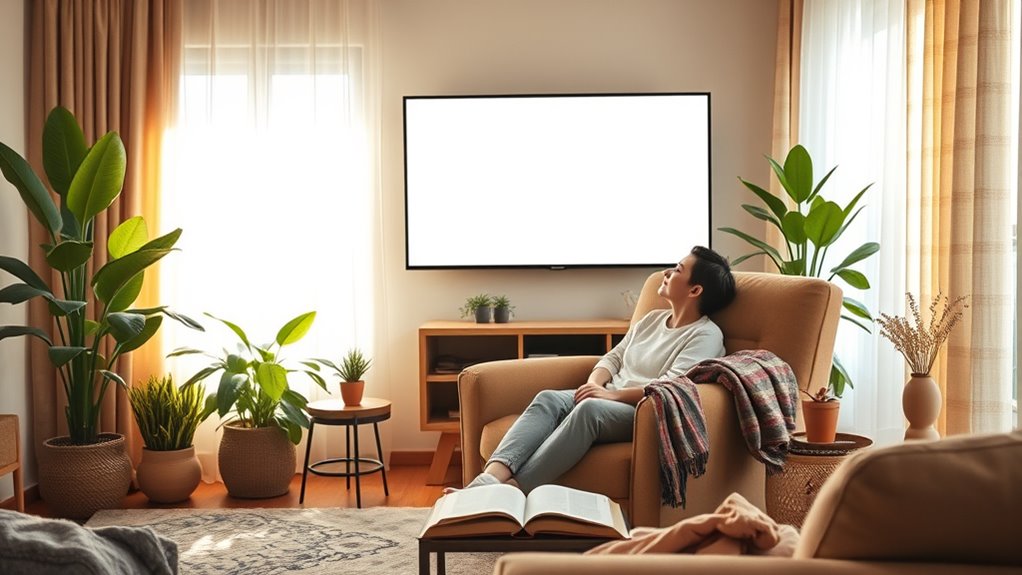
Since constant exposure to stressful news and social media can heighten anxiety, it’s important to set boundaries around your online consumption. News fatigue can drain your mental energy, making it harder to stay positive. To combat this, try these strategies:
- Limit your news intake to specific times each day to prevent overwhelm.
- Take regular social media detoxes, even if just for a few hours, to reset your mind.
- Unfollow or mute sources that consistently trigger stress or anxiety.
Set Boundaries to Protect Your Personal Time
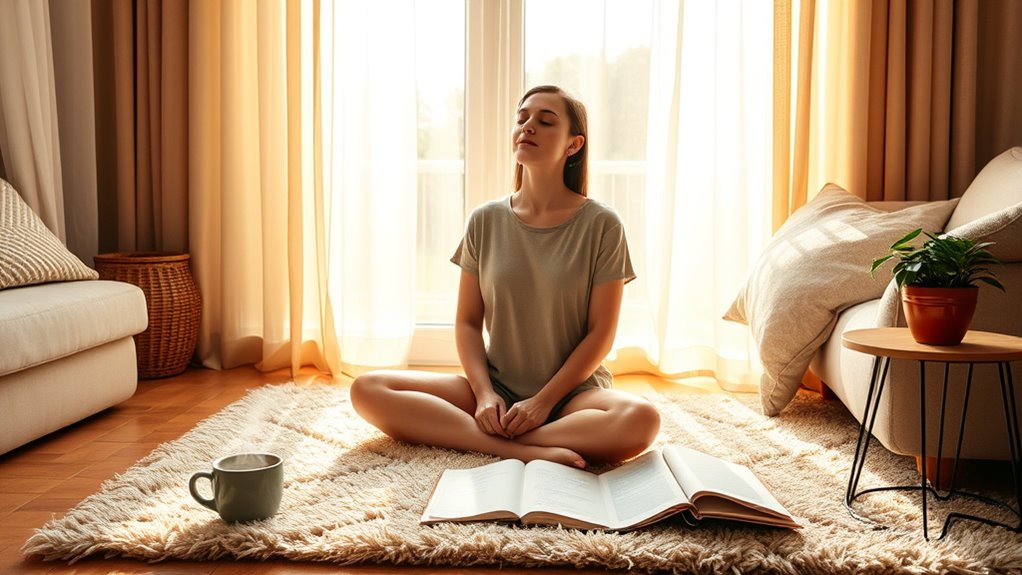
Setting clear boundaries around your personal time is essential for maintaining your mental well-being. Establishing personal time boundaries helps prevent work or household demands from encroaching on your space, ensuring you safeguard alone time. Communicate your limits to family members or colleagues, so they understand when you’re unavailable. Turn off work notifications after hours and create designated periods for yourself each day. Protect these moments fiercely, recognizing that taking time for yourself isn’t selfish—it’s necessary. By actively setting boundaries, you reduce stress and create a safe space for relaxation and reflection. Remember, safeguarding alone time allows you to recharge, stay balanced, and handle daily challenges with greater resilience. Prioritize these boundaries to nurture your mental health effectively.
Engage in Activities That Bring Joy and Relaxation
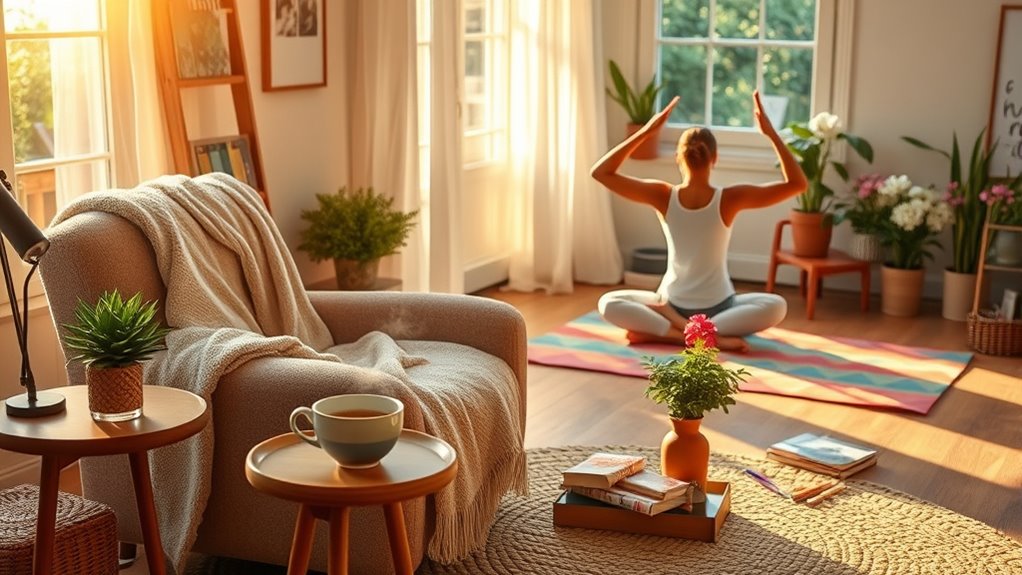
Engaging in activities that bring joy and relaxation can considerably ease your stress and boost your mood. When you dedicate time to these pursuits, you give yourself a mental break and foster positivity. Consider trying these activities:
- Explore creative hobbies like painting, knitting, or writing to express yourself and unwind.
- Go on outdoor adventures such as hiking, biking, or gardening to reconnect with nature and refresh your mind.
- Practice mindful relaxation techniques like yoga or meditation to calm your nervous system.
Incorporating these activities into your routine helps break the cycle of stress, promotes relaxation, and nurtures your emotional well-being. Make time for what makes you happy and enjoy the benefits of a more balanced, peaceful life.
Frequently Asked Questions
How Can I Recognize When My Stress Levels Are Becoming Unhealthy?
You can recognize when your stress levels are becoming unhealthy by paying attention to signs to watch for, such as feeling overwhelmed or exhausted. Emotional indicators like irritability, anxiety, or difficulty concentrating are common signs. If you notice physical symptoms like headaches or trouble sleeping, it’s a clear signal your stress might be too high. Being mindful of these signs helps you take steps to manage your stress before it worsens.
What Are Quick Stress Relief Techniques for Busy Days?
Imagine your busy day feels like a crowded subway train. To find quick relief, try breathing exercises—inhale slowly for four seconds, hold, and exhale. Pair this with mindfulness practices, like focusing on your senses or a calming image. These techniques help you reset instantly, reducing stress and bringing clarity. Keep a few minutes for this routine, and you’ll feel more centered even during hectic moments.
How Does Sleep Affect Stress and Anxiety Management?
Sleep plays a crucial role in managing stress and anxiety. Good sleep hygiene guarantees you get restful sleep, helping your brain process emotions effectively. Dream analysis can reveal underlying worries, allowing you to address them. When you prioritize quality sleep, you boost your mood and resilience, making it easier to handle daily stressors. So, focus on consistent sleep routines and explore your dreams to support better stress management.
Can Diet Influence My Stress Levels and How?
Did you know that poor diet can increase your stress levels by up to 30%? Your nutritional impact directly affects mood regulation, so eating balanced meals with whole foods, lean proteins, and fresh fruits can stabilize blood sugar and boost your mood. Avoiding excessive caffeine and sugar helps prevent crashes and anxiety spikes. By choosing nutritious foods, you support your mental health and keep stress more manageable.
What Should I Do if Stress Feels Overwhelming and Unmanageable?
When stress feels overwhelming, you should take immediate steps to regain control. Try mindfulness exercises like deep breathing or meditation to calm your mind. If it remains unmanageable, don’t hesitate to seek professional support from a therapist or counselor. Remember, reaching out is a sign of strength, and professional guidance can help you develop effective coping strategies to manage stress more effectively.
Conclusion
So, after all these tips, you might find managing stress as easy as avoiding it altogether—by simply pretending it’s not there. Ironically, the more you try to ignore your worries, the more they seem to stick around. But with a little effort and a dash of humor, you’ll discover that taking small steps can turn chaos into calm. Who knew that managing stress could be as simple as not taking it too seriously?

